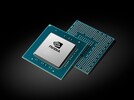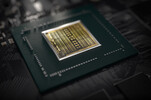NVIDIA Quadro T1000 Max-Q vs NVIDIA GeForce GTX 1660 Ti Max-Q
NVIDIA Quadro T1000 Max-Q
► remove from comparison
Die Nvidia Quadro T1000 with Max-Q Design ist eine professionelle Grafikkarte für Notebooks und mobile Workstations der Mittelklasse. Sie basiert auf den selben TU117 Turing-Chip wie die Consumer GTX 1650 für Laptops, jedoch mit nur 768 Shader (versus 896 der GTX 1650). Die stärkere Quadro T2000 basiert auf den selben Chip, bietet jedoch doppelt so viele CUDA Kerne und ist damit deutlich schneller. Die Max-Q Variante ist eine auf Effizienz optimierte Version der Quadro T1000 mit verringerten Taktraten. Nach aktuellen Informationen gibt es zwei Varianten mit 35 und 40 Watt Stromverbrauch (TGP) und unterschiedlichen Taktraten.
| Model | Shader | TGP (W) | Base (MHz) | Boost (MHz) |
| Quadro T1000 Mobile | 768 | 50 | 1395 | 1455 |
| Quadro T1000 Max-Q | 768 | 40 | 1230 | 1455 |
| Quadro T1000 Max-Q | 768 | 35 | 795 | 1455 |
| Quadro T2000 Mobile | 1024 | 60 | 1575 | 1785 |
| GeForce GTX 1650 Mobile | 896 | 50 | 1395 | 1560 |
Die Quadro-Grafikkarten bieten zertifizierte Treiber, welche auf Stabiltität und Performance bei professionellen Anwendungen (CAD-, DCC-, Medizin-, Prospektions-, Visualisierungsanwendungen) optimiert sind. Dadurch ist die Performance im Vergleich zu den Consumergrafikkarten mit gleichem Chip in diesen Bereichen deutlich besser. Durch den selben maximalen Boost-Takt wie die normale (Max-P) Variante der Quadro T1000, kann die Leistung der Max-Q Version bei ausreichen Kühlung vergleichbar sein. Die garantierten Mindesttaktraten sind jedoch deutlich darunter.
Die kleineren Chips der Turing Serie bietet im Unterschied zu den stärkeren RTX Karten (z.B. Quadro RTX 3000) keine Raytracing und Tensor Kerne. Bei der Turing Architektur gab es auch auf der Ebene der CUDA-Kerne deutliche Verbesserungen. Float und INT Operationen können nun gleichzeitig ausgeführt werden, der Cache wurde vereinheitlicht und verbessert und Adaptive Shading eingeführt. Nvidia spricht dadurch von einer bis zu 50% höheren Leistung pro Kern im Vergleich zu Pascal.
Dank des geringen Stromverbrauchs (35 - 40 Watt) eignet sich der in 12nm FFT (TSMC) produzierte Chip auch für dünne und leichte Notebooks.
NVIDIA GeForce GTX 1660 Ti Max-Q
► remove from comparison
Die Nvidia GeForce GTX 1660 Ti mit Max-Q Design für Laptops ist eine mobile Grafikkarte basierend auf der Turing Architektur. Sie ist gedacht für dünne und leichte Notebook und je nach Kühlungsdesign etwa 10-15% langsamer als eine normale GTX 1660 Ti für Laptops (22% geringerer Basis-Takt und 16% geringerer Boost-Takt). Sie basiert wie die Desktop-Version auf den TU116 Chip und wurde Ende April 2019 vorgestellt. Die GTX 1660 Serie bietet im Unterschied zu den stärkeren RTX 2000er Karten (z.B. RTX 2060) keine Raytracing und Tensor Kerne. Die Leistung sollte vergleichbar mit einer GTX 1070 Max-Q sein, jedoch bei deutlich geringerem Stromverbrauch von 60 Watt TGP (versus 80 Watt der Laptop 1660 Ti und 115 Watt der Desktop-Version).
Im April 2020 gab es einen Refresh der GeFroce GTX 1660 Ti Max-Q mit dem Codenamen N18E-G0-A1. Die Specs bleiben aber vergleichbar, der Chip ist im selben Package erhältlich wie die neuen RTX Chips (z.b. RTX 2070 Super).
Bei der Turing Architektur gab es auch auf der Ebene der CUDA-Kerne deutliche Verbesserungen. Float und INT Operationen können nun gleichzeitig ausgeführt werden, der Cache wurde vereinheitlicht und verbessert und Adaptive Shading eingeführt. Nvidia spricht dadurch von einer bis zu 50% höheren Leistung pro Kern im Vergleich zu Pascal.
Der Stromverbrauch ist mit 60 Watt TGP (Total Graphics Power) von Nvidia spezifiziert und damit 20 Watt unterhalb der normalen (Max-P) Version. Dadurch eignet sich die GPU auch für dünnere Gaming-Laptops. Der verbaute TU116 Chip wird bei TSMC im 12nm FFN Verfahren gefertigt.
| NVIDIA Quadro T1000 Max-Q | NVIDIA GeForce GTX 1660 Ti Max-Q | |||||||||||||||||||||||||||||||||||||||||||||||||||||||||||||||||||||||||||||||||||||
| GeForce GTX 1600 Serie |
|
| ||||||||||||||||||||||||||||||||||||||||||||||||||||||||||||||||||||||||||||||||||||
| Codename | N19P-Q1 | N18E-G0 | ||||||||||||||||||||||||||||||||||||||||||||||||||||||||||||||||||||||||||||||||||||
| Architektur | Turing | Turing | ||||||||||||||||||||||||||||||||||||||||||||||||||||||||||||||||||||||||||||||||||||
| Pipelines | 768 - unified | 1536 - unified | ||||||||||||||||||||||||||||||||||||||||||||||||||||||||||||||||||||||||||||||||||||
| Kerntakt | 795 / 1230 - 1455 (Boost) MHz | 1140 - 1335 (Boost) MHz | ||||||||||||||||||||||||||||||||||||||||||||||||||||||||||||||||||||||||||||||||||||
| Speichertakt | 8000 MHz | 12000 MHz | ||||||||||||||||||||||||||||||||||||||||||||||||||||||||||||||||||||||||||||||||||||
| Speicherbandbreite | 128 Bit | 192 Bit | ||||||||||||||||||||||||||||||||||||||||||||||||||||||||||||||||||||||||||||||||||||
| Speichertyp | GDDR5 | GDDR6 | ||||||||||||||||||||||||||||||||||||||||||||||||||||||||||||||||||||||||||||||||||||
| Max. Speichergröße | 4 GB | 6 GB | ||||||||||||||||||||||||||||||||||||||||||||||||||||||||||||||||||||||||||||||||||||
| Shared Memory | nein | nein | ||||||||||||||||||||||||||||||||||||||||||||||||||||||||||||||||||||||||||||||||||||
| API | DirectX 12_1, OpenGL 4.6 | DirectX 12_1, OpenGL 4.6 | ||||||||||||||||||||||||||||||||||||||||||||||||||||||||||||||||||||||||||||||||||||
| Stromverbrauch | 35 - 40 Watt | 60 Watt | ||||||||||||||||||||||||||||||||||||||||||||||||||||||||||||||||||||||||||||||||||||
| Herstellungsprozess | 12 nm | 12 nm | ||||||||||||||||||||||||||||||||||||||||||||||||||||||||||||||||||||||||||||||||||||
| Notebookgröße | mittel (15.4" z.B.) | mittel (15.4" z.B.) | ||||||||||||||||||||||||||||||||||||||||||||||||||||||||||||||||||||||||||||||||||||
| Erscheinungsdatum | 27.05.2019 | 23.04.2019 | ||||||||||||||||||||||||||||||||||||||||||||||||||||||||||||||||||||||||||||||||||||
| Herstellerseite | www.nvidia.com |
Benchmarks
3DM Vant. Perf. total + NVIDIA GeForce GTX 1660 Ti Max-Q
Cinebench R15 OpenGL 64 Bit + NVIDIA GeForce GTX 1660 Ti Max-Q
GFXBench T-Rex HD Offscreen C24Z16 + NVIDIA GeForce GTX 1660 Ti Max-Q
Average Benchmarks NVIDIA GeForce GTX 1660 Ti Max-Q → 0% n=0
* Smaller numbers mean a higher performance
1 This benchmark is not used for the average calculation
Spiele-Benchmarks
Die folgenden Benchmarks basieren auf unseren Spieletests mit Testnotebooks. Die Performance dieser Grafikkarte bei den gelisteten Spielen ist abhängig von der verwendeten CPU, Speicherausstattung, Treiber und auch Betriebssystem. Dadurch müssen die untenstehenden Werte nicht repräsentativ sein. Detaillierte Informationen über das verwendete System sehen Sie nach einem Klick auf den fps-Wert.

Horizon Zero Dawn
2020
Death Stranding
2020
F1 2020
2020
Gears Tactics
2020
Doom Eternal
2020
Hunt Showdown
2020
Escape from Tarkov
2020
Need for Speed Heat
2019
GRID 2019
2019
FIFA 20
2019
Borderlands 3
2019
Control
2019
F1 2019
2019
Rage 2
2019
Anno 1800
2019
The Division 2
2019
Dirt Rally 2.0
2019
Anthem
2019
Far Cry New Dawn
2019
Metro Exodus
2019
Apex Legends
2019
Darksiders III
2018
Battlefield V
2018
Monster Hunter World
2018
Far Cry 5
2018
X-Plane 11.11
2018
Fortnite
2018
Rocket League
2017
Overwatch
2016
Rainbow Six Siege
2015
Metal Gear Solid V
2015
Dota 2 Reborn
2015
The Witcher 3
2015
GTA V
2015
BioShock Infinite
2013
Tomb Raider
2013Eine Liste mit weiteren Spielen und allen Grafikkarten finden Sie auf unserer Seite: Welches Spiel ist mit welcher Grafikkarte spielbar?




























